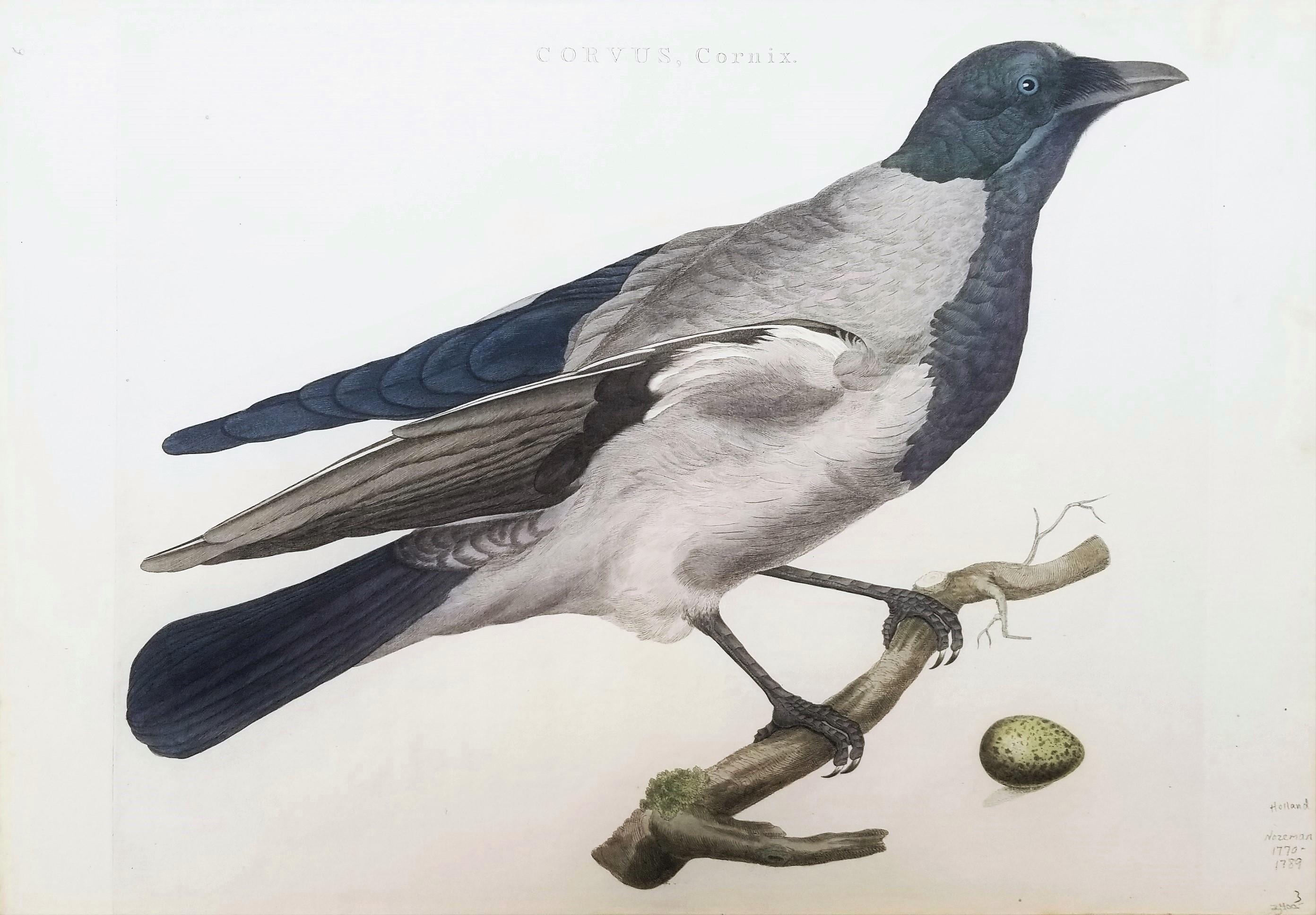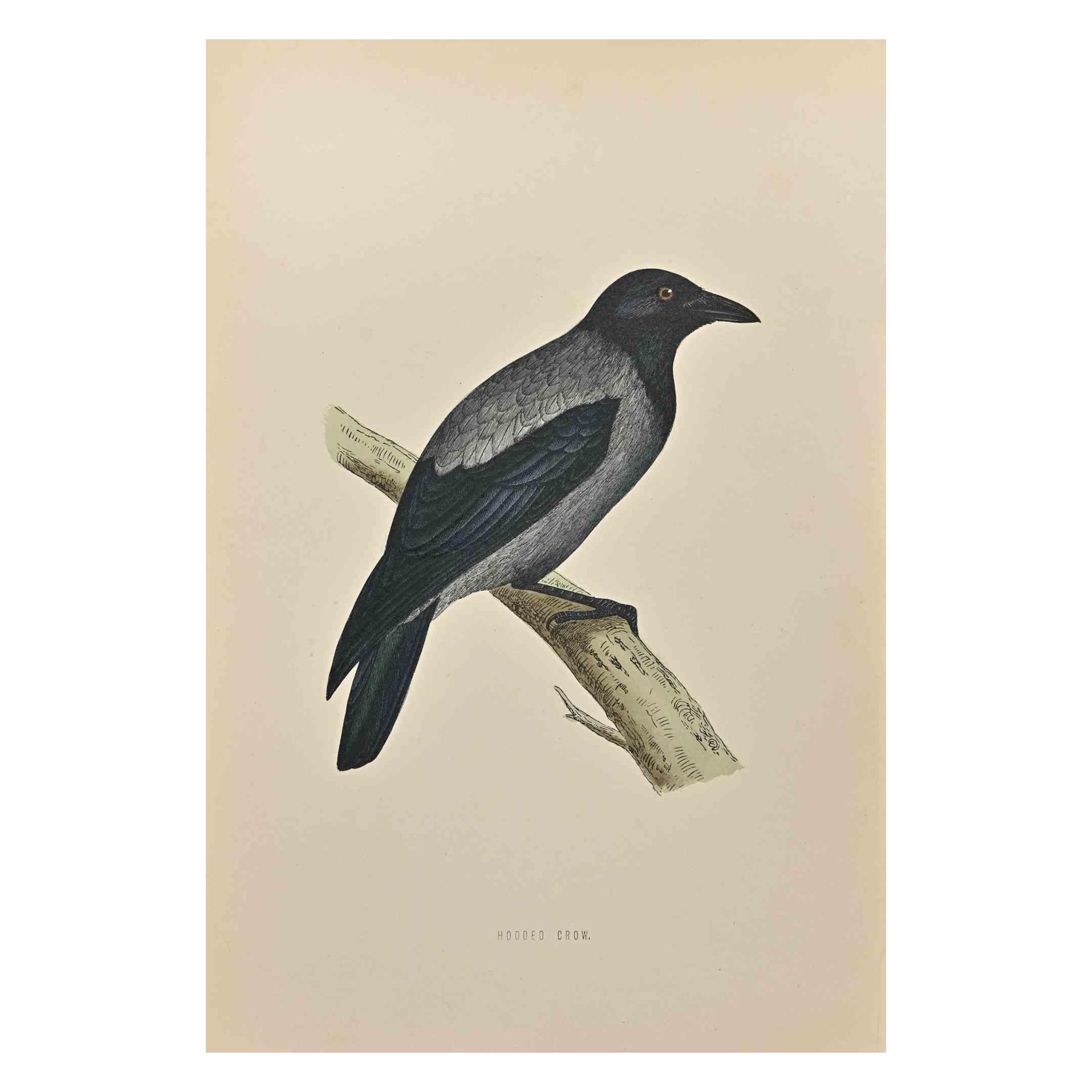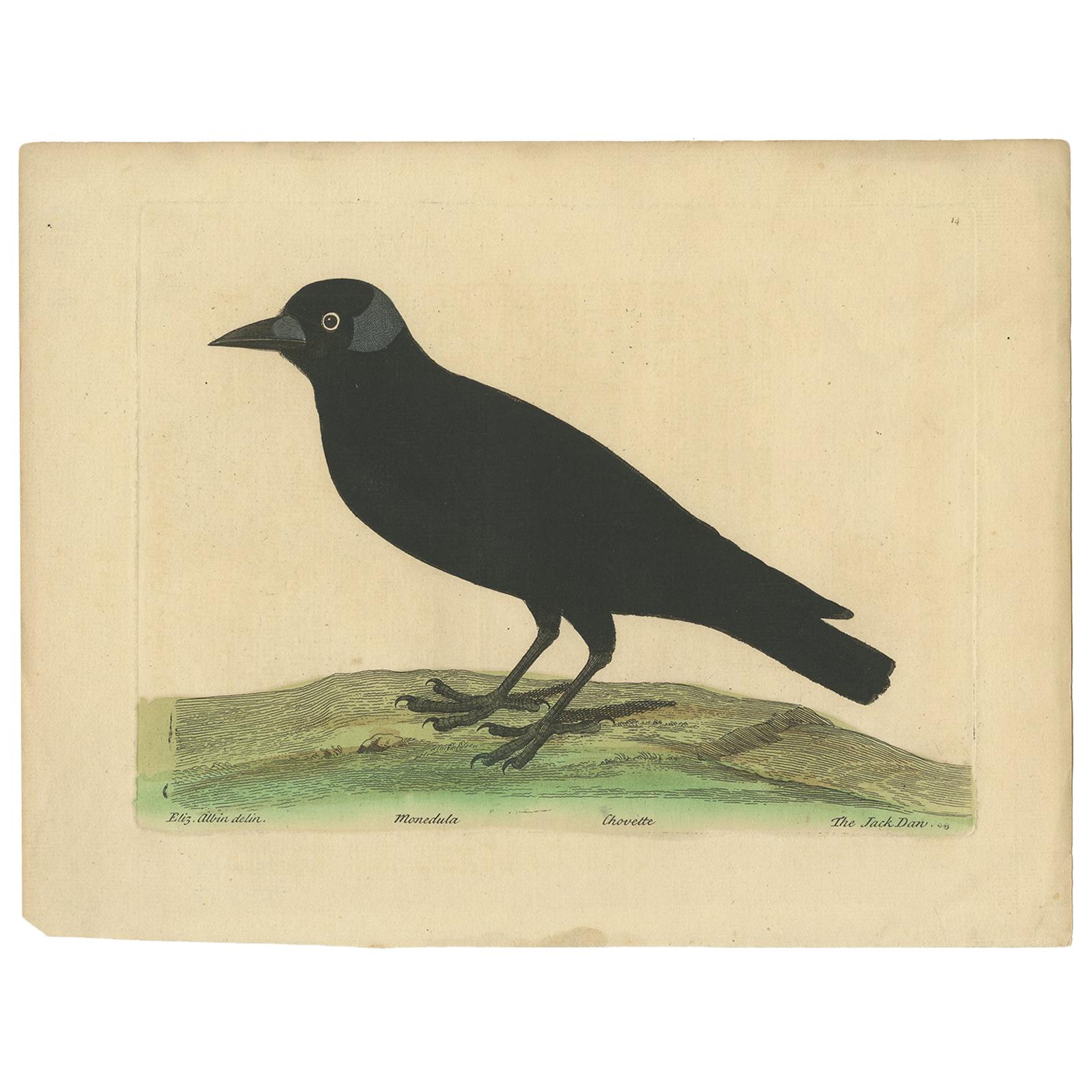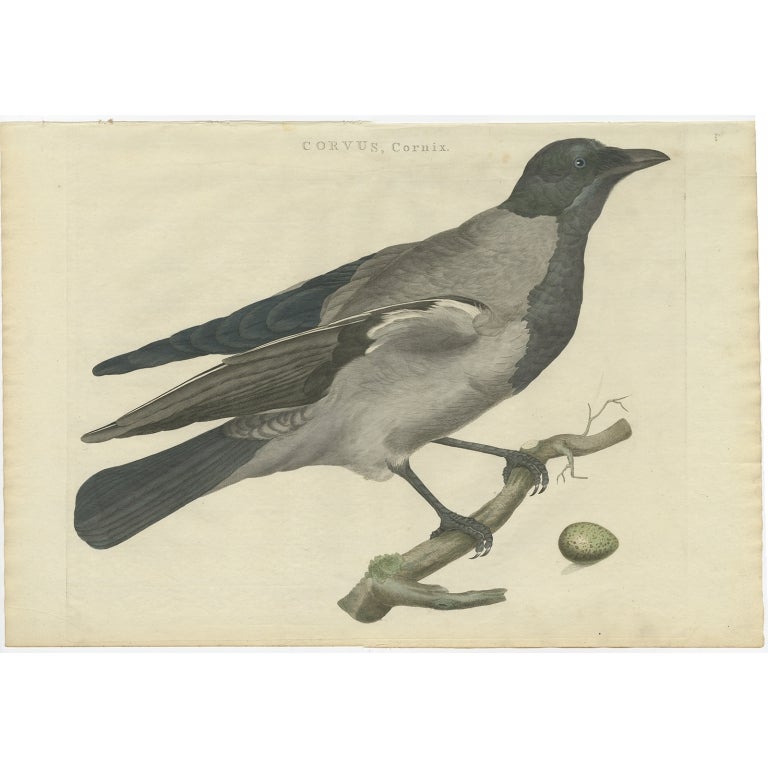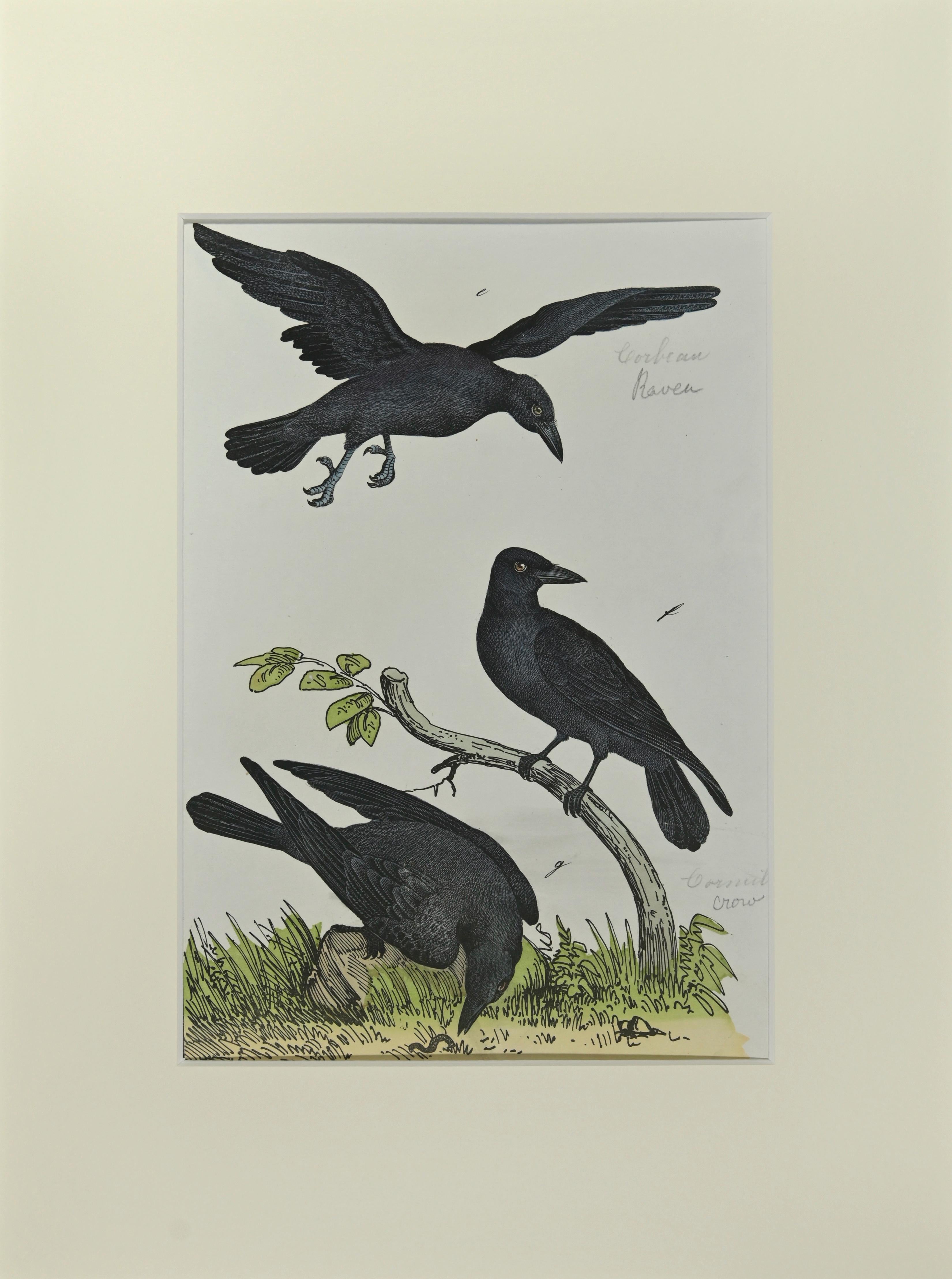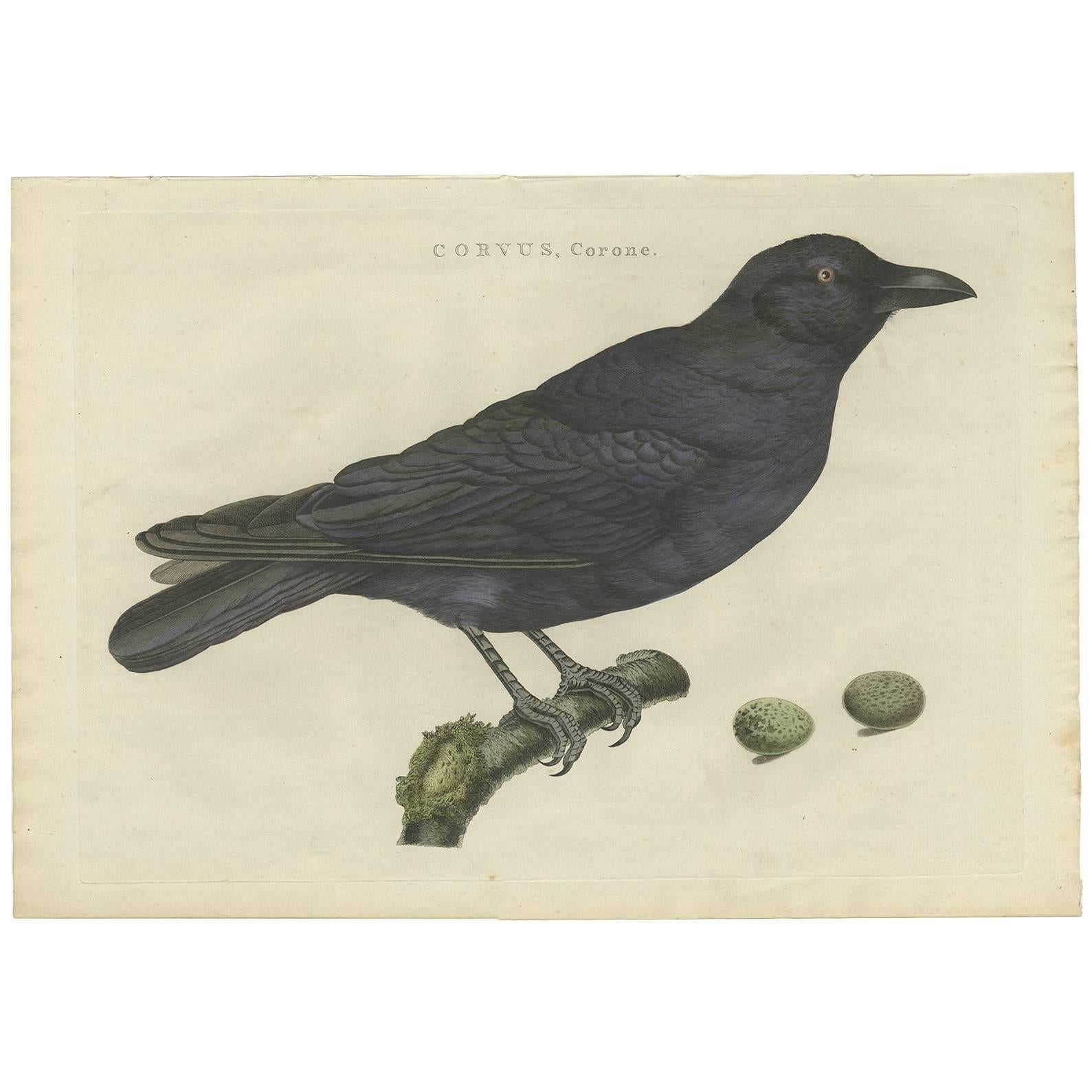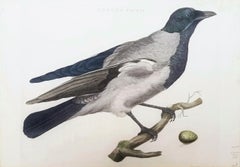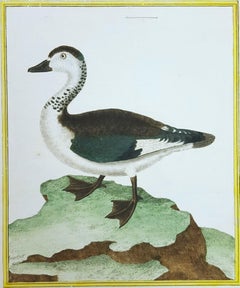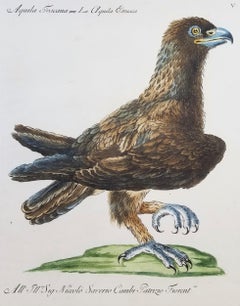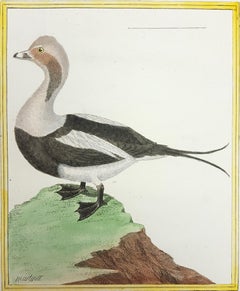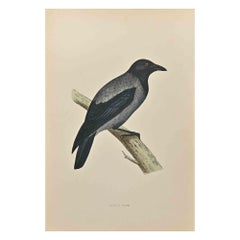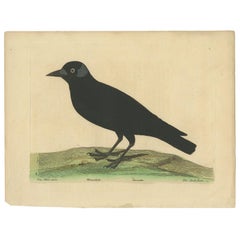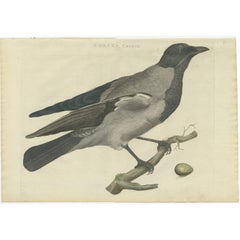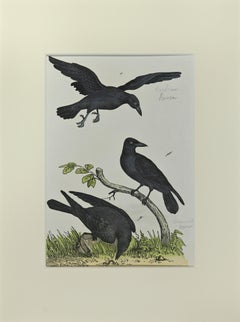Items Similar to The Royston Crow (Hooded Crow) /// Thomas Pennant Ornithology Bird Animal Art
Want more images or videos?
Request additional images or videos from the seller
1 of 17
Thomas PennantThe Royston Crow (Hooded Crow) /// Thomas Pennant Ornithology Bird Animal Art1761-1766
1761-1766
$2,400
£1,823.19
€2,100.03
CA$3,433.44
A$3,765.57
CHF 1,942.06
MX$44,982.98
NOK 24,631.29
SEK 23,106.94
DKK 15,688.74
About the Item
Artist: Thomas Pennant (Welsh, 1726-1798)
Title: "The Royston Crow (Hooded Crow)" (Plate D1)
Portfolio: The British Zoology, Class II: Birds
Year: 1761-1766 (First edition)
Medium: Original Hand-Colored Engraving on Strasbourg Lily laid paper
Limited edition: Unknown
Printer: J. and J. March for The Cymmrodorion Society, London, UK
Publisher: J. and J. March for The Cymmrodorion Society, London, UK
Reference: Anker No. 392; Brunet IV No. 478; Sitwell page 131; Nissen No. IVB710
Sheet size: 14.32" x 21"
Image size: 10.5" x 16.88"
Condition: Light toning and some areas of minor discoloration to sheet. Has been professionally stored away for decades. In very good condition with strong colors
Very rare
Notes:
Provenance: private collection - Aspen, CO. Engraved by Irish artist Peter Mazell (1733-1808) after a painting by British artist Peter Paillou (1720-1790). The hand-coloring was also executed by Peter Paillou. Comes from Pennant's one volume "The British Zoology, Class II: Birds", (1761-1766) (First edition), which consists of 132 hand-colored engravings. "P 76" printed upper right is the page number, not the plate number. Strasbourg Lily watermark with "VG" underneath in center of sheet.
The hooded crow (Corvus cornix), also called the scald-crow or hoodie, is a Eurasian bird species in the genus Corvus. Widely distributed, it is found across Northern, Eastern, and Southeastern Europe, as well as parts of the Middle East. It is an ashy grey bird with black head, throat, wings, tail, and thigh feathers, as well as a black bill, eyes, and feet. Like other corvids, it is an omnivorous and opportunistic forager and feeder.
Biography:
Thomas Pennant (27 June [O.S. 14 June] 1726 – 16 December 1798) was a Welsh naturalist, traveller, writer and antiquarian. He was born and lived his whole life at his family estate, Downing Hall near Whitford, Flintshire, in Wales.
As a naturalist he had a great curiosity, observing the geography, geology, plants, animals, birds, reptiles, amphibians, and fish around him and recording what he saw and heard about. He wrote acclaimed books including British Zoology, the History of Quadrupeds, Arctic Zoology and Indian Zoology although he never travelled further afield than continental Europe. He knew and maintained correspondence with many of the scientific figures of his day. His books influenced the writings of Samuel Johnson. As an antiquarian, he amassed a considerable collection of art and other works, largely selected for their scientific interest. Many of these works are now housed at the National Library of Wales.
As a traveller he visited Scotland and many other parts of Britain and wrote about them. Many of his travels took him to places that were little known to the British public and the travelogues he produced, accompanied by painted and engraved colour plates, were much appreciated. Each tour started at his home and related in detail the route, the scenery, the habits and activities of the people he met, their customs and superstitions, and the wildlife he saw or heard about. He travelled on horseback accompanied by his servant, Moses Griffith, who sketched the things they encountered and later worked these up into illustrations for the books. He was an amiable man with a large circle of friends and was still busily following his interests into his sixties. He enjoyed good health throughout his life and died at Downing at the age of seventy-two.
- Creator:Thomas Pennant (1726 - 1798, Welsh)
- Creation Year:1761-1766
- Dimensions:Height: 14.32 in (36.38 cm)Width: 21 in (53.34 cm)
- Medium:
- Movement & Style:
- Period:1760-1769
- Condition:(Very Good).
- Gallery Location:Saint Augustine, FL
- Reference Number:1stDibs: LU121214534662
About the Seller
5.0
Platinum Seller
Premium sellers with a 4.7+ rating and 24-hour response times
Established in 1978
1stDibs seller since 2015
1,352 sales on 1stDibs
Typical response time: <1 hour
- ShippingRetrieving quote...Shipping from: Saint Augustine, FL
- Return Policy
Authenticity Guarantee
In the unlikely event there’s an issue with an item’s authenticity, contact us within 1 year for a full refund. DetailsMoney-Back Guarantee
If your item is not as described, is damaged in transit, or does not arrive, contact us within 7 days for a full refund. Details24-Hour Cancellation
You have a 24-hour grace period in which to reconsider your purchase, with no questions asked.Vetted Professional Sellers
Our world-class sellers must adhere to strict standards for service and quality, maintaining the integrity of our listings.Price-Match Guarantee
If you find that a seller listed the same item for a lower price elsewhere, we’ll match it.Trusted Global Delivery
Our best-in-class carrier network provides specialized shipping options worldwide, including custom delivery.More From This Seller
View AllCorvus, Cornix (Hooded Crow) /// Dutch Ornithology Bird Animal Engraving Print
By Cornelius Nozeman
Located in Saint Augustine, FL
Artist: Cornelius Nozeman (Dutch, 1720-1786)
Title: "Corvus, Cornix (Hooded Crow)" (Plate 106)
Portfolio: Nederlandsche Vogelen (Dutch Birds)
Year: 1770-1829
Medium: Original Hand-Co...
Category
1770s Old Masters Animal Prints
Materials
Watercolor, Laid Paper, Engraving, Intaglio
Sacelle male, de la cote de Coromandel /// Ornithology Martinet Bird Animal Art
By François Nicolas Martinet
Located in Saint Augustine, FL
Artist: François-Nicolas Martinet (French, 1731-1800)
Title: "Sacelle male, de la cote de Coromandel" (Plate 949)
Portfolio: Histoire Naturelle Des Oiseaux
*Signed by Martinet in the...
Category
1770s Old Masters Animal Prints
Materials
Watercolor, Laid Paper, Engraving, Intaglio
Eagle /// Antique Ornithology Bird Saverio Manetti Italian Watercolor Engraving
By Saverio Manetti
Located in Saint Augustine, FL
Artist: Saverio Manetti (Italian, 1723-1785)
Title: "Eagle" (Plate V - 5)
Portfolio: Storia Naturale Degli Uccelli (The Natural History of Birds)
Year: 1767-1776
Medium: Original Hand-Colored Engraving on watermarked laid paper
Limited edition: Unknown
Printer: Unknown
Publisher: heirs of Francesco Mouck (Vols. I-III), Gaetano Cambiagi (Vol. IV), Giuseppe Vanni (Vol. V), Florence, Italy
Reference: Ayer/Zimmer page 241; Fine Bird Books page 120; McGill/Wood, page 450; Nissen IVB No. 588
Sheet size: 16.75" x 14.5"
Platemark size: 13.63" x 10.88"
Condition: Some minor surface marks mainly in margins. In excellent condition with strong colors
Rare
Notes:
Provenance: private collection - Haarlem, Netherlands. Engraved and hand-colored by Italian artists Lorenzo Lorenzi (Active: 1750-1780) and Violante Vanni (1732-1776). Latin and Italian texts by Saverio Manetti. Comes from Manetti's monumental five volume "Storia Naturale Degli Uccelli (The Natural History of Birds)", (1767-1776), which consists of 600 hand-colored engravings. Unidentified watermark in very center of sheet. Comes with its accompanying information sheet.
Eagle is the common name for many large birds of prey of the family Accipitridae. Eagles belong to several groups of genera, some of which are closely related. Most of the 60 species of eagle are from Eurasia and Africa.
Manetti's extraordinary "Storia Naturale Degli Uccelli (The Natural History of Birds)", 1767-1776 was commissioned by Maria Luisa, the Grand Duchess of Tuscany. It is a massive 5 book volume set...
Category
1770s Old Masters Animal Prints
Materials
Watercolor, Engraving, Handmade Paper, Laid Paper, Intaglio
Canard de Miclon (Old Squaw) /// Ornithology Martinet Bird Animal Art Duck
By François Nicolas Martinet
Located in Saint Augustine, FL
Artist: François-Nicolas Martinet (French, 1731-1800)
Title: "Canard de Miclon (Old Squaw)" (1008)
Portfolio: Histoire Naturelle Des Oiseaux
*Signed by Martinet in the plate (printed...
Category
1770s Old Masters Animal Prints
Materials
Watercolor, Laid Paper, Engraving, Intaglio
Ardea, Nycticorax (Black-crowned Night Heron) /// Dutch Ornithology Bird Animal
By Cornelius Nozeman
Located in Saint Augustine, FL
Artist: Cornelius Nozeman (Dutch, 1720-1786)
Title: "Ardea, Nycticorax (Black-crowned Night Heron)" (Plate 78)
Portfolio: Nederlandsche Vogelen (Dutch Bird...
Category
1770s Old Masters Animal Prints
Materials
Watercolor, Laid Paper, Engraving, Intaglio
Le Millouinan /// Ornithology Martinet Bird Animal Art Duck Natural History
By François Nicolas Martinet
Located in Saint Augustine, FL
Artist: François-Nicolas Martinet (French, 1731-1800)
Title: "Le Millouinan" (Plate 1002)
Portfolio: Histoire Naturelle Des Oiseaux
*Signed by Martinet in the plate (printed signatur...
Category
1770s Old Masters Animal Prints
Materials
Watercolor, Laid Paper, Engraving, Intaglio
You May Also Like
Hooded Crow - Woodcut Print by Alexander Francis Lydon - 1870
Located in Roma, IT
Hooded Crow is a modern artwork realized in 1870 by the British artist Alexander Francis Lydon (1836-1917) .
Woodcut print, hand colored, published by L...
Category
1870s Modern Figurative Prints
Materials
Woodcut
Antique Bird Print of the Western Jackdaw by Albin 'circa 1738'
Located in Langweer, NL
Antique print titled 'Monedula - Chovette'.
Old bird print of the western jackdaw. The western jackdaw (Coloeus monedula), also known as the Eurasian jackdaw, European jackdaw, or ...
Category
Antique Mid-18th Century Prints
Materials
Paper
$142 Sale Price
20% Off
Antique Bird Print of the Hooded Crow by Sepp & Nozeman, 1797
Located in Langweer, NL
Antique print titled 'Corvus, Cornix'. This print depicts the hooded crow with egg (Dutch: bonte kraai). The hooded crow (Corvus cornix) (also called hood...
Category
Antique 18th Century Prints
Materials
Paper
$856 Sale Price
20% Off
Crow - Etching by Johann Friedrich Naumann - 1840
Located in Roma, IT
Crow is an Etching hand colored realized by Gotthilf Heinrich von Schubert - Johann Friedrich Naumann, Illustration from Natural history of birds in pictures, published by Stuttgart ...
Category
1840s Modern Figurative Prints
Materials
Etching
Carrion Crow with Eggs – Hand-Coloured Engraving from Nozeman, 1797
By Cornelius Nozeman, M. Houttuyn, J.C. Sepp
Located in Langweer, NL
Carrion Crow with Eggs – Hand-Coloured Engraving from Nozeman’s Nederlandsche Vogelen, 1770–1829
Antique print titled 'Corvus, Corone'. The carrion crow (Corvus corone) is a large, ...
Category
Antique Late 18th Century Dutch Prints
Materials
Paper
$903 Sale Price
20% Off
Animal drawing of sitting crow in black by enlightened british painter
By Peter Paillou
Located in Milan, IT
Peter Paillou (c.1720 – c.1790) was a British artist best known for his paintings of birds, many of which were used as book illustrations. He gained repute in the 18th century as a natural history painter and illustrator. He was employed by two leading naturalists and antiquarians of the time, Taylor White (1701-1772) and Thomas Pennant (1726-1798). He illustrated the latter's British Zoology and decorated the hall at Downing, Pennant's house in Flintshire, with several pictures of birds...
Category
18th Century Realist Animal Drawings and Watercolors
Materials
Tempera, Watercolor
More Ways To Browse
Antique Crow
Antique Pennants
Samuel Johnson
Antique Feeders
Hooded Crows
Chromolithograph Eggs
Icelandic Falcon
Le Picador
George Rodrigue Blue Dog Paintings
Jeu De La Cape
New Orleans Jazz Festival
Ori Reisman
Owl Woodcut
Pablo Picasso Le Picador Ii
Pablo Picasso Pigeons
Prang Lithograph
Vintage Forest Service
Audubon Engraving
